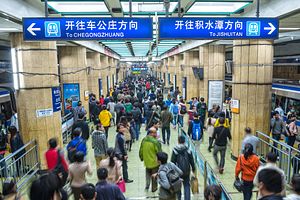There’s a pernicious and persistent piece of conventional wisdom in conversations about China’s political stability that is often presented as a truism: the Chinese Communist Party’s (CCP) legitimacy stems from its ability to deliver high economic growth; if economic growth disappears, so will its legitimacy; this in turn will lead to the beginning of the end of the CCP.
The a priori appeal is evident since the reason stands the test of common sense. After all, assuming a broad definition of “legitimacy,” it would make sense that keeping citizens happy through high economic growth would prevent social unrest or calls for a new form of government. How do you keep citizens happy? Well, you can expand the economic pie, ensuring that everyone gets a larger slice—more per capita GDP leads to more per capita happiness leads to less revolution and upheaval. For CCP elites, mass upheaval over economic outcomes is best avoided by keeping China’s year-on-year growth rates as high as possible.
New research challenges this conventional wisdom with evidence. A new Global Working Paper (PDF warning) from the Brookings Institution inverts the reasoning I outlined above. Measuring “legitimacy” is of course a tricky endeavor, so the paper instead measures well-being—roughly how happy citizens are—against China’s economic performance (the word “legitimacy” does not appear in the paper). The paper additionally looks at the prevalence of mental health disorders in China. The finding of interest, distilled in a Brookings blog post, is as follows:
We find that the standard determinants of well-being are the same for China as they are for most countries around the world. At the same time, China stands out in that unhappiness and reported mental health problems are highest among the cohorts who either have or are positioned to benefit from the transition and related growth—a clear progress paradox. These are urban residents, the more educated, those who work in the private sector, and those who report to have insufficient leisure time and rest.
The paper’s finding has already drawn intelligent commentary from a few commentators (political scientist Jay Ulfelder and blogger T. Greer have posted important reactions). The finding that well-being, particularly among Chinese economic “elites,” is decoupled—and even inversely correlated—with China’s overall economic growth would suggest that the CCP’s survival might be independent of China’s overall economic performance. Thus, the CCP thrives not because it makes Chinese elites happy, but despite Chinese elites’ unhappiness.
As Ulfelder summarizes:
These survey results contradict the “performance legitimacy” story that many observers use to explain how the Chinese Communist Party has managed to avoid significant revolutionary threats since 1989 (see here, for example). In that story, Chinese citizens choose not to demand political liberalization because they are satisfied with the government’s economic performance. In effect, they accept material gains in lieu of political voice.
The decline in overall well-being among elites does present a serious challenge to the conventional explanation of the CCP’s legitimacy. The authors of the Brookings report also highlight previous studies of well-being and life satisfaction in China that measured a large decline in happiness among “the lowest-income and least-educated segments of the population.” In previous studies, China’s “upper socioeconomic strata” exhibited a rise in happiness, somewhat confirming the conventional wisdom explanation. Additionally, the authors note numerous independent variables that affect happiness, including rural/urban status, internal migration status (urban households and migrant households report lower happiness levels than their rural, non-migrant counterparts).
Where does the CCP’s legitimacy come from then? As Greer notes, maybe looking at the per capita distribution of wealth in China has been the wrong measure all along—it’s unnecessarily reductive and dismissive of the opinions of actual Chinese people. Instead, Chinese people would attribute the legitimacy of the CCP to specific policy initiatives (i.e., fighting corruption, delivering justice to wrong-doers within the country’s power apparatus) as well as more diffuse, nation-level factors (i.e., the CCP’s “role in helping China, as a country and a nation, become wealthy, powerful, and respected on the international stage”).
The long-term survival of the CCP may be the most consequential question for China in the 21st century, both for external observers watching China’s rise and for internal stakeholders. It’s undoubtedly important thus to understand how Chinese citizens relate to their government and experience life as China continues to grow. Still, it’s best to update our beliefs on how the CCP sustains its political legitimacy when presented with new data. The often-repeated economic performance explanation of the CCP’s legitimacy is not only outmoded—it appears to have never really been based in reality.

































